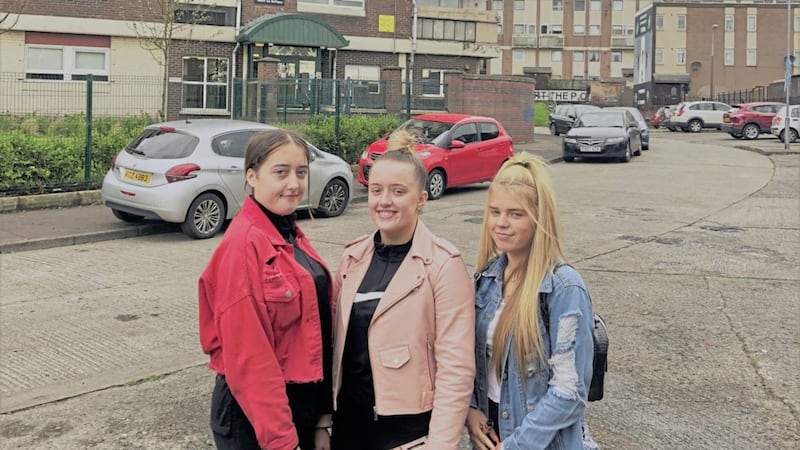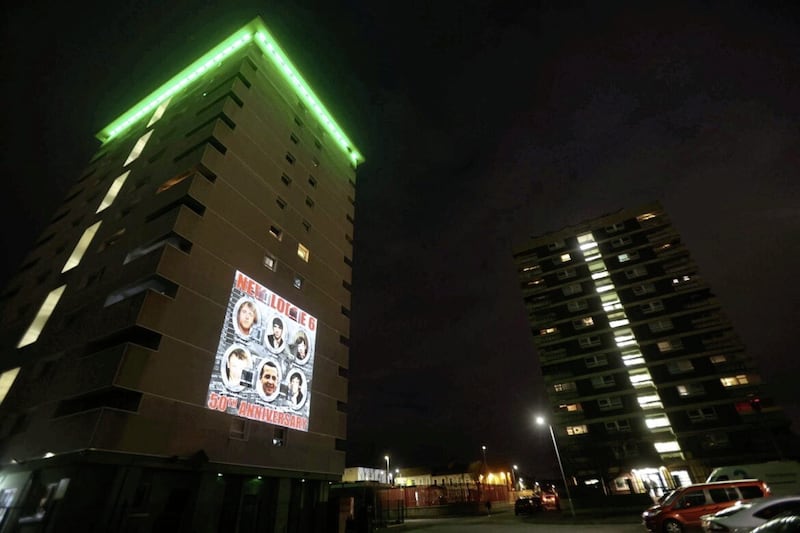THEY'VE attended more funerals than youth clubs this year.
The New Lodge is one of the most socially deprived areas of the north, with high rates of suicide, mental illness and addiction issues.
Even the pop star Rihanna told them they come from a 'hopeless place'.
But despite this the young people - labelled 'feral' and 'hoods' by some - remain positive and engaging in circumstances that would break most adults.
This week the north Belfast teenagers have agreed - after some persuasion - not to go ahead with a planned bonfire in the area and all wood has now been removed.
Last August the bonfire resulted in riot police being deployed to the New Lodge to remove the material.
Two young men sat on top of the pyre and refused to budge. After a 10-hour stand-off the PSNI eventually withdrew and crowds that arrived for the fire caused carnage, with local people left terrified, many too afraid to stay in their homes.
The bonfire is traditionally lit on August 8, to mark the anniversary of the introduction of internment without trial in 1971.
The issues around it are clear - few people in the area welcome it, it attracts anti-social behaviour, and places life, property and the young people themselves at risk.
Removing the wood seems a simple fix. However, the more complex issue of generational neglect and poverty is not so easily resolved.
Claudia Flynn is just 14 and wants to own her own crèche one day. Tiny in stature, she takes no nonsense and is the first to step forward to speak on the group's behalf.
She says the bonfire brought her and her friends together in an area with little else to offer, giving them "something to do".
"We get called the bad kids, but we're not - you should see the kinds of things people say about us on Facebook."
Mollie Clinton is 15 years old. She wants to travel and be a make up artist, but closer to home she says she feels unfairly labelled simply because of where she lives.
"We get called scumbags and everything. You tell people where you're from - they say 'that place is stinking, ever see the state of it'.
"People say it's the dirtiest place in the world."
The young people recently organised a clean-up of the streets but say they only get noticed when something "bad happens".
Youth worker Tarlach Mac Dhónaill deals with a group of about 40 young people from the New Lodge, a place defined by high-rise flats and economic disadvantage.
While other groups provide youth provision in the area, these are the hard-to-reach teenagers. They've slipped through numerous cracks in the system and now rely on the unconventional but clearly essential team of Tarlach and his co worker Terri Hillick.
They have secured a small amount of funding to take the young people away for two days over the weekend when the bonfire would usually take place.
This is an unusual occurrence as the group receive little or no financial support.
"The usual youth facilities are only taking groups of 10 because of coronavirus, so I've the money to take them away but it's just proving impossible to get them all away together and I don't want to leave any behind," Tarlach says.
"We could go camping but some of the girls aren't fussed on that idea.
"We don't get core funding, we don't even have a premises - on a Wednesday night they let us into the Recce (North Queen Street Community Centre) for a couple of hours.
"It really is neglect. Ninety per cent of my work wouldn't be allowed in a traditional youth setting. I can get called out at 2am because two 14-year-olds are on drugs and need brought home.
"It's really hard. I've good support and it is rewarding, but I've no personal life any more, this is my life.
"Some engage with other youth clubs, but there's a lot of them barred and so really have nowhere else to go.
"Normal youth provision is amazing and I'd like to see more of it, but normal youth provision is drafted by someone in a university in England, they don't take into consideration the situation these young people are in.
"They've been to five funerals this year and it has been their friends' mummies, young women who have died by suicide or drugs.
"I've spent more time in chapels and graveyards with these kids than in the youth club.
"They're in grief and trauma. The trauma we've had this year would break many adults, but they're still so positive.
"They continue to engage and continue to be positive and joyous when they've every right in the world to be violent, but they're not."
Michael Stewart (19) previously defended the bonfire: "The best part is the collecting, it brings everyone together."
However, after last year's mayhem he accepts that he can't control who attends.
He wants to be an electrician but lost an apprenticeship offer due to the Covid lockdown.
"Do you know any electricians would take him on?" Tarlach asks.
"They'll take part in anything positive that's offered to them, but after years of trying to change the image they're still labelled.
"No-one tries to sits down with them and understand they behave in the way they do.
"But if something does go wrong, who gets the blame?
"Not the politicians, not the agencies that have abandoned these children.
"Society instead points a collective finger at a 14-year-old kid - shame on every one of them."








